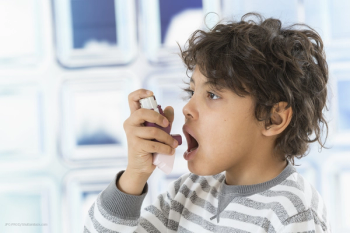
Several Biologics To Treat Severe Asthma Can Be Self-Administered at Home — Patients Prefer It
Xolair (omalizumab), Fasenra (benralizumab), Dupixent (dupilumab) and Nucala (mepolizumab) can now be self-administered.
Patients with severe asthma are often burdened with frequent exacerbations requiring numerous visits to clinics and doctors’ offices for symptom monitoring and treatment evaluation. New severe asthma treatments, specifically biologics, have helped manage severe asthma symptoms and decrease the frequency of exacerbations. In this respect, they have helped improve patients’ quality of life. However, many patients using biologics for severe asthma must receive treatment from a healthcare professional at a clinic or doctor’s office. This may involve making a trip to a healthcare facility at least every 4 weeks for treatment administration.
Biologics currently FDA-approved to treat severe asthma are all injectables. However, four of the six approved agents are now available in formulations that can be self-administered at home with training from a healthcare provider. Genentech’s Xolair (omalizumab) is available as a prefilled syringe for subcutaneous self-injection in patients 12 years or older with severe allergic asthma. A caregiver may administer Xolair at home to children ages 6 to 11 years.
AstraZeneca’s Fasenra Pen (benralizumab) is a prefilled autoinjector for subcutaneous self-injection in patients ages 12 years or older with severe eosinophilic asthma.
Dupixent (dupilumab), made by Regeneron and Sanofi, is available as a prefilled pen and a prefilled syringe that can be self-administered subcutaneously in patients 12 years and older with moderate to severe eosinophilic asthma. Caregivers may administer Dupixent prefilled syringes to children ages 6 to 11 years.
And in January of this year, the FDA approved a prefilled autoinjector and a prefilled pen for self-injection for GlaxoSmithKline’s Nucala (mepolizumab). Both forms are approved for subcutaneous self-injection in patients 12 years or older with severe eosinophilic asthma. Caregivers may administer Nucala to children ages 6 to 11 years with approval from a healthcare professional.
A study
After receiving self-administration instructions from a healthcare professional, 93% of participants reported that it was easy to self-administer their medication. Of these, 52% considered the process extremely easy, and 94% felt safe while self-injecting the biologic. Mild side effects were reported by 22% of patients within 2 to 3 days of self-administration. Of all participants, 97% said they would recommend self-administration of biologic treatment for severe asthma.
Newsletter
Get the latest industry news, event updates, and more from Managed healthcare Executive.























